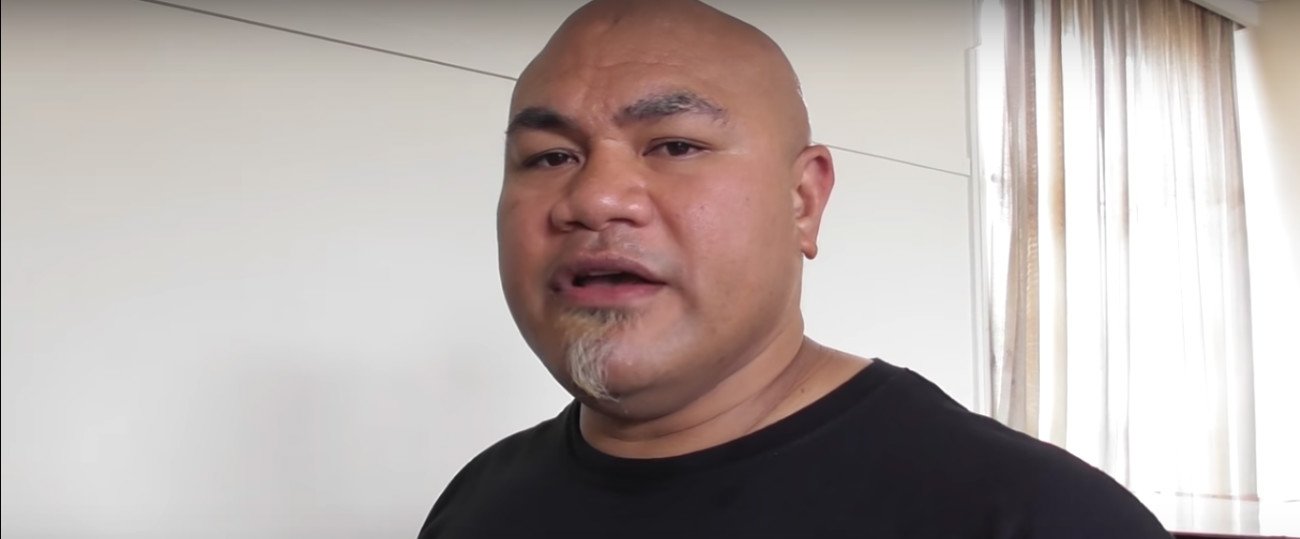It may not seem it, but David Tua’s final KO win took place almost ten long years ago; this October. That was back when Tua, one of the most lethal punching heavyweights of the 1990s and early 2000s, starched Shane Cameron in an all-New Zealand clash. Next year, as he has proudly posted on his facebook page, Tua will be enshrined in The National Boxing Hall of Fame (in April of 2020, along with Sugar Ray Leonard).
It’s not The International HOF, but it’s still a big honor for any fighter, and Tua is more than deserving.
Isn’t he?
Just how good was “The Tuamanator?”
There is no denying the crunching power Tua had, in his left hand especially, nor is there any denying his granite, take anything and keep on coming chin (see his near decapitation of the usually sturdy John Ruiz for a chilling example of the former, his 12-round hammer and tongs war with Ike Ibeabuchi for an example of the latter). But Tua was beaten in his career-biggest fight, against Lennox Lewis, he was never a world champion, and he was often listless in appearance and unfocused in fights.
Bursting onto the world stage with that sickening KO of “The Quiet Man” back in March of 1996, former Olympian and all-round decorated amateur Tua had a good team around him, including peerless cheerleader Lou Duva, who was as thrilled as can be at the prospect/contender he now had his hands on, and Tua was clearly as exciting as he was wickedly powerful.
The future looked bright.
At 23-0 (19) and a young and fresh 23 years of age, Tua was suddenly the hot young heavyweight puncher to talk about. Following up the Ruiz destruction in New Jersey with a trio of impressive stoppage wins, over Darroll Wilson, David Izon and Oleg Maskaev, Tua then met “The President,” the soon to lose his marbles (and his freedom/career) Ibeabuchi.
What took place on the evening of June 7, 1997, on HBO’s Boxing After Dark series, was a truly great heavyweight battle. Two men, each blessed with power, durability and stamina to die for, gave it their all as they slugged it out for 36-minutes, combining to sling out more leather than Ali and Frazier had done in the eternally celebrated “Thrilla in Manila.”
Tua lost the close decision, yet in some ways this fight/performance was his finest hour. In fact, some people say Ike – who lost it big time shortly after the war and began acting seriously crazy (insisting on being referred to at all times by his presidential nickname; later doing unspeakable things to a prostitute inside a hotel bathroom) – suffered irreversible brain trauma as a result of the unrelenting slugfest.
Tua marched on, attempting to put his first pro defeat behind him. Causing more mayhem as he thrilled us with more X-rated TV entertainment, Tua overcame Hasim Rahman in another tough fight (winning somewhat controversially) and he then iced Obed Sullivan in double-quick fashion.
Then came Tua’s one and only crack at the world title.
Facing a prime Lennox Lewis in November of 2000, Tua was given the proverbial boxing lesson. Never allowed to let his howitzers go, much less land on target, Tua lost almost every round as Lewis boxed and jabbed and ring-generalled his way to victory. Never before had Tua been so mercilessly shut down.
It was back to the drawing board.
A points loss to the slick but boring (in the opinion of many) Chris Byrd further diminished Tua’s earning power and his chances at a second shot at the world crown, but then, eight months later in 2002, Tua took out another slick operator in Fres Oquendo, thus reviving his ranking. The 29 year old “Tuaman” then went through former light-heavyweight and heavyweight ruler Michael Moorer like a hot knife through butter, taking “Double-M” out in way less than a single round.
But then, after a draw with Rahman in their return in 2003, Tua would box only sporadically – just 13 more times before his eventual retirement in 2013. It was this version of Tua that blew hot and cold, mostly cold. No longer the hungry destroyer, Tua was content to win decisions over the likes of Cisse Salif, Robert Hawkins and Friday Ahunanya – with the brief return to form against Cameron sandwiched in.
Then, in a clear sign of how his once lethal tools had been encrusted with far too much rust to ever remove, Tua was held to a draw, and then beaten by Monte Barrett. One final loss, just Tua’s fifth, came at the hands of the big but slow Alexander Ustinov – and that was it for Tua, his career ending with a whimper, not a bang.
Tua’s legacy may be that of a fearsome puncher who, in his prime, was able to steamroll either past champions or future champions. Failing to win the big one himself, Tua has to go down as a nearly man. For a time, however, the man born Mafaufau Tavita Lo Mafaufau Sanerivi Talimatasi really did light up the heavyweight division.
How we could use a primed and peaking Tua, 52-5-2(43) today.
